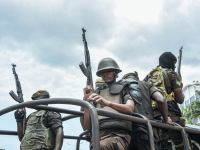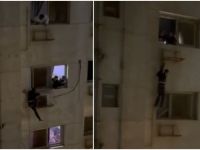Drafted to fight in the German army during the Second World War, he bravely abandoned his post after nearly being executed when he refused to ambush a group of US soldiers.
Hardy Krüger, who has died aged 93, went on to find fame in blockbuster Hollywood films including The One That Got Away, A Bridge Too Far, the Flight of the Phoenix and the Wild Geese - before launching a second career as a popular author.
The star, who retired from the screen in the late 1980s, died at his home in California on Wednesday.
In a statement, Krüger's family lauded his 'warmth of heart' and 'unshakable sense of justice,' after he became one of the few German actors to become known for his roles globally.
Born in Berlin in 1928, Krüger's father, an engineer, was a supporter of Adolf Hitler and an early member of the Nazi Party.
After Adolf Hitler's rise to power in 1933, Hardy decided he wanted to follow follow in his father's footsteps by joining the Nazi party.
While attending an elite Nazi boarding school he appeared in the 1944 film Junge Adler (Young Eagles) - his first screen role - which was intended to be a propaganda piece.
However, Krüger later detailed how his experience with older actors on the set helped him realise the horrors of Adolf Hitler's dictatorship.
His fledgling screen career was then interrupted at the age of 16 when he was drafted by the German Wehrmacht later in 1944 - after the tide of the war had turned against Germany.
He went on to fight for the newly-formed 38th SS Division Nibelungen in 1945. The unit was tasked with facing experienced American troops on the Danube Front in south-eastern Germany.
The German troops came under repeated pressure to retreat in the face of the superior firepower.
Krüger nearly met his fate when he was ordered to ambush a group of US soldiers and refused.
After being sentenced to death for cowardice he was nearly executed - before another SS officer overturned the ruling.
Krüger then deserted his post and was captured by the Allies. He spent time as a prisoner-of-war but then escaped and hid in Italy until the end of the war.
By this time, the Nazis had murdered nearly all of their six million Jewish victims in the Holocaust. The mass slaughter was carried out in a series of death camps in occupied Poland and Germany.
In an interview for German daily publication Bild in 2006, Hardy recounted how he and his school friends were sent to the front 'as cannon fodder' in Hitler's futile attempt to halt the Allies' advance.
'I knew the war was lost,' he said. 'I knew that there were concentration camps and that the Nazis were a bunch of criminals.'
From 1944 onwards, Hitler ordered the creation of the 'People's Army' in anticipation of an Allied invasion.
It was made up of men aged from 16 to 60, although children as young as eight were reported to have been captured by American troops.
Some boys aged 12 and under were seen manning artillery units, whilst girls were forced into armed combat, or operating anti-aircraft guns alongside boys.
In the Battle of Berlin in 1945, when Russian troops converged on the German capital, boys and girls were on the frontline and were being urged to fight by a radio station that rallied children with the cry of 'Besser tot als rot' – better dead than red.
After the war, Krüger struggled to pay for acting school, and so resumed his career with small stage roles, before gaining the attention of worldwide audiences with a role in the British film The One That Got Away in 1957.
The film sees Krüger play a German Luftwaffe pilot shot down over Britain in 1940, and documents his attempts to escape captivity, and the actor perfectly fit the criteria of the blond German solder.
Speaking to German magazine Der Spiegel in 2003, he said: 'I had no interest in playing the war criminal' and said he wanted to portray one of the many Germans who were unwilling participants in the war.
Fluent in German, English and French, Hardy later starred in the French picture Sundays and Cybèle, which won an Oscar for Best Foreign Language Film in 1962.
In 1975 he also starred as Captain Potzdorf in Stanley Kubrick's Barry Lyndon opposite Ryan O'Neal, and The Wild Geese With Richard Burton in 1978.
Overall, the German played a leading role in more than 75 films over a career that spanned 40 years.
His most famous role was in the epic war film A Bridge too Far, which boasted a star-studded cast including James Caan, Michael Caine and Sean Connery.
He portrayed Generalmajor der Waffen-SS Karl Ludwig and the film focused on the failed Operation Market Garden, which saw the European allies attempt to create an invasion route into northern Germany.
Hardy eventually retired from acting in the late 1980s, and went on to publish 16 books.
He also directed several documentaries about his travels round the world, and even owned a farm in Tanzania at the foot of Mount Kilimanjaro.
The star also spoke out in favour of democracy and against extremism, at an array of events throughout his career.
When asked if he was afraid of death in 2018, ahead of his 90th birthday - Krüger told German press agency DPA: 'I grew up with death, I got used to it.'
Krüger was married three times; firstly to Renate Densow from 1950 to 1964, after they had daughter Christiane Krüger in 1945.
His second wife was Italian painter Francesca Marazzi from 1964 to 1977, and they had two children, Malaika in 1967, and Hardy Krüger Jnr in 1968.
Most recently Krüger was married to Anita Park, who he wed in 1978.
His son Hardy Jnr, 53, has become a well-known actor in his own right, starring in various European TV films and dramas, and his daughter Christiane, 76, has landed roles in German TV shows.
Krüger's Hamburg-based literary agent, Peter Kaefferlein, said that he died 'suddenly and unexpectedly' in California, where he lived with his third wife writer Anita Park.
The statement said: 'The fight against racism and the education of young people was his personal mission in life, his warmth, his joy for life and his unshakable sense of justice made him unforgettable.'
One of Hardy's German followers took to Twitter to pay tribute, writing: 'Ad Astra Hardy Krüger. Thank you for the countless adventures and trips.'
BBC's Patrick Jackson added: 'Thanks also for giving us the scariest officer ever in Barry Lyndon.'







